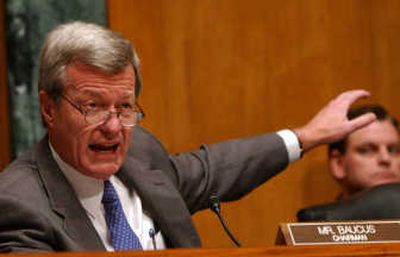Budget draws bipartisan criticism

WASHINGTON – Top administration officials were on Capitol Hill on Tuesday defending President Bush’s $3.1 trillion budget plan from complaints by Democrats that it adds almost $800 billion to U.S. debt and doesn’t pay for the war in Iraq.
Democrats on two Senate panels tossed brickbats at Bush’s budget and some key Republicans criticized it as well, as lawmakers made it plain they would ignore the president’s proposals to cut and Medicaid spending.
At the Senate Budget Committee, White House budget chief Jim Nussle put in a combative performance, returning criticism of Bush’s budget with attacks on lawmakers for not fully funding his long-pending war request and challenging them to join Bush in curbing the rapid growth of benefit programs.
Senate Budget Chairman Kent Conrad, D-N.D., slammed the budget for piling $761 billion in debt onto the government’s books, both in bonds held by investors at home and abroad and IOUs in the Social Security trust funds.
“The debt has done nothing under this president’s watch but skyrocket,” charged Conrad.
“Then let’s open up mandatory spending,” Nussle shot back, referring to the spiraling growth of benefit programs like Medicare.
Top panel Republican Judd Gregg, of New Hampshire, again criticized the Bush blueprint for having “some serious flaws from the standpoint of accuracy and even more serious flaws from the standpoint of policy.” But he also attacked Democrats for assuming phony revenue boosts when passing a congressional budget plan last year.
A few floors below, at the Finance Committee, with jurisdiction over taxes and Medicare, the atmosphere was more sedate, but the Bush budget plan wasn’t faring any better.
“A good budget must be realistic,” Sen. Max Baucus, D-Mont., said at a hearing featuring Treasury Secretary Henry Paulson. Baucus, Finance Committee chairman, said key aspects of the Bush budget – proposed cuts in health programs, making Bush’s tax cuts permanent and omitting war costs in predicting a budget surplus by 2012 – failed that test.
The top Republican on the panel, Sen. Charles Grassley of Iowa, chided the administration for not considering the costs of adjusting the alternative minimum tax in future years.
Paulson defended the first-ever $3 trillion federal budget proposal introduced Monday, saying its emphasis on a pro-growth tax system, entitlement reform and a balanced budget was in the best interest of the country. But his opening remarks centered on prodding the Senate to act quickly on an economic stimulus package aimed at keeping the country out of recession.
Bush’s budget for fiscal year 2009 beginning Oct. 1 proposes spending just below $3.1 trillion. Last year, he proposed $2.9 trillion for the current budget year, but the administration now estimates that spending in fiscal 2008 will also exceed $3 trillion once all the costs of the continuing war in Iraq are included.
Excluding the war, Bush proposes an 8 percent increase in the Pentagon’s base budget, to $515.4 billion, next year. Overall defense spending would decline from $670.5 billion this year to $588.3 billion in Bush’s 2009 budget. The request includes just $70 billion in initial war costs, a figure certain to be exceeded when Bush leaves office.
Some spending increases would be offset by $196 billion in savings to Medicare and Medicaid programs over the next five years and reducing or eliminating 151 programs, saving $18 billion.